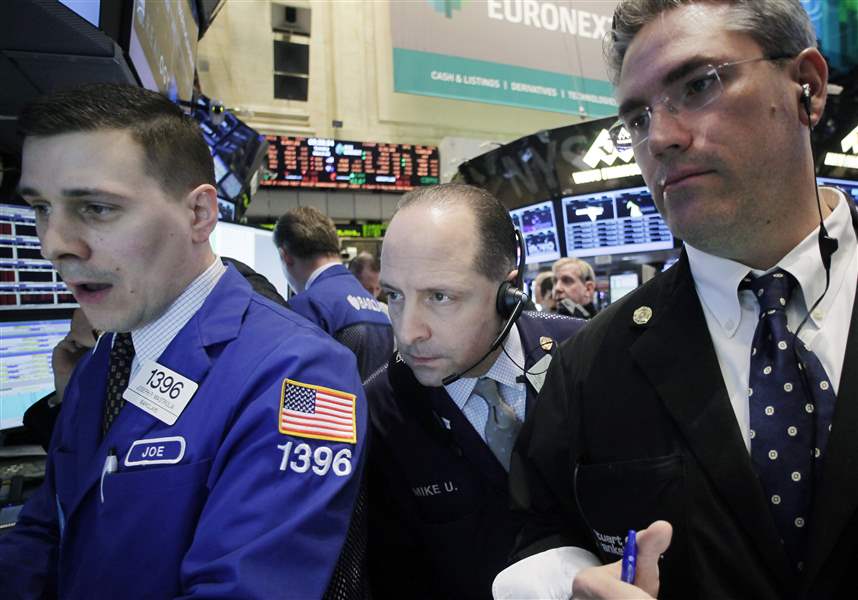
Dow surges to record ... and keeps going
A new record: Dow surpasses 2007 peak
3/6/2013
The Dow Jones industrial average surpassed its record today.
ASSOCIATED PRESS

The Dow Jones industrial average surpassed its record today.
NEW YORK — The Dow has never been higher.
The Dow Jones industrial average set an intraday record and kept going today. It jumped from the opening bell, climbed as much as 158 points early and reached 14,286, breaking through its previous record high set on Oct. 11, 2007.
It closed at 14,253.92, breaking the previous record close of 14,164.53, set on Oct. 9, 2007.
The gains represent a remarkable comeback for the stock market. The Dow has more than doubled since falling to a low of 6,547 in March, 2009, following the financial crisis and the onset of the Great Recession. Stocks have rebounded sharply since then, helped by stimulus from the Federal Reserve, even as the economic recovery has been slow and steady.
“Whether they want to admit it or not, everyone is very impressed with the resilience of the market,” said Alec Young, a global equity strategist at S&P Capital IQ.
The last time the Dow was this high, Apple had just sold its first iPhone and George W. Bush had another year as president. The U.S. housing market had yet to bottom, and the financial crisis that brought down Lehman Brothers was still a year away.
The recovery in stocks may even have been quicker had memories of the financial system's near-collapse not been on investors’ minds, said Robert Pavlik, chief market strategist at Banyan Partners.
“It's still pretty close to the front of people's brains,” he said. “That's one of the reasons that people are hesitant to invest in the stock market.”
That could be changing. More money has been flowing into stock mutual funds since the beginning of the year.
Now, investors who have missed out on the run-up may be deciding to get off the sidelines, Mr. Pavlik said.
The Dow opened higher Tuesday following a surge in markets across the globe. China's markets rose after the government said it would support ambitious growth targets. European markets jumped following a surprisingly strong rise in retail sales across the 17-country group that uses the euro. In the U.S., more hopeful news about housing kept the momentum going.
Even with stocks trading at, or close to, record levels, they are still a good investment because earnings have risen so much, says Darell Krasnoff, Managing Director at Bel Air investment Advisors.
“People get overly focused on benchmarks,” he said. “The fact that it's reached that level is an interesting landmark, but it doesn't say anything about whether the market is over-, or under-valued.”
Stocks are also attractive compared with bonds after a five-year rally in the debt market that pushed yields to record lows.
The yield on the 10-year Treasury note, currently at 1.90 percent, is still lower than the yield of about 2.1 percent on the S&P 500, which measure the ratio of dividend payments to stock prices.
Despite the rise in the Dow, the U.S. economy has not fared as well. Unemployment was just 4.7 percent when the Dow last reached a record five and half years ago, versus 7.9 percent today.
But the economy is strengthening in many areas. Housing is recovering, companies are hiring more and Corporate America's earnings are strong. That helped drive a 9 percent rise in stocks this year, impressing even the most ardent skeptics. For all of last year, the index rose 7 percent.
Stocks are also benefiting from the economic stimulus from the Federal Reserve and other global central banks.
Under a program called “quantitative easing,” the Fed has bought trillions of dollars of bonds, pushing up their prices and sending their yields lower. That makes stocks more attractive to investors than bonds and keeps interest rates low throughout the economy, encouraging investment and spending.
The U.S. central bank began buying bonds in January 2009 and is still purchasing $85 billion each month in Treasury bonds and mortgage-backed securities.
The Dow has even managed to climb to a record despite the backdrop of political wrangling in Washington, with automatic government budget cuts taking effect Friday after President Obama and Congress failed to reach a budget deal. Economists expect the cuts to hurt U.S. economic growth and though both Republicans and Democrats have pledged to retroactively undo the cuts, they have given no indication yet of how that process would take shape.
OBJECT